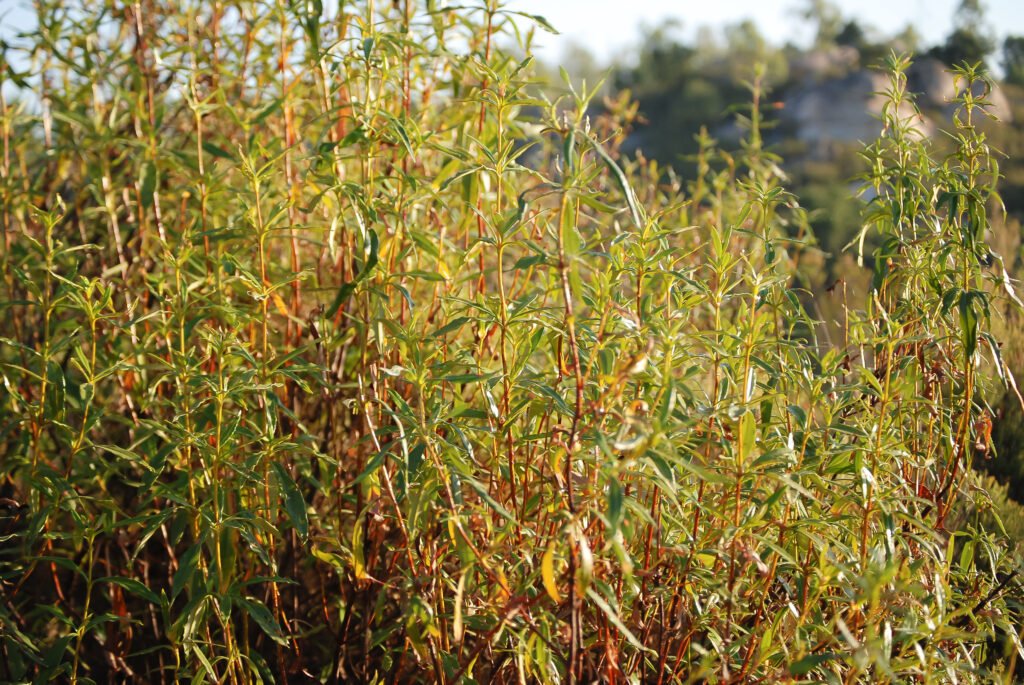Through the production of a large range of products, made from the twigs or directly extracted from the resin, we act to protect tradition and biodiversity.
ABOUT CISTUS
Cistus ladaniferus var. beta maculatus is the only cistus species to be used in perfumery. Though the plant grows throughout the Mediterranean, it is especially abundant in Andalusia, where the arid climate encourages growth. It flowers from April to June producing large ephemeral white flowers with purple blotches. Once it has finished flowering, between May and June, new branches appear. The long stems of the cistus shrub produce an olfactory treasure: a scented gum resin called labdanum which fills the air across the hills with an intoxicating perfume.
Until the beginning of the 20th century, the gum was harvested directly in the fields by allowing goats to pass through. Their fleece would be full of the gum from passing near the shrubs. In the 20th century, the gum was harvested by whipping the branches with rakes called Ladanisterion, which were made with strips of leather. The strips were then scraped with a knife to collect the gum. Nowadays, the cistus twigs are harvested manually with sickles.
PLANT TO EXTRACT
The manual cutting of cistus twigs begins in July when they are swollen with gum. Only the shoots of the year are cut. Once cut, the leafy twigs are gathered into 25 kg bundles before being taken to the factory and extracted.
Meteorological conditions are very important for cistus plants to give a good yield: if there is too much rain in the harvest season, the plant’s resin will be “washed away” and if it doesn’t rain at all and the air is too dry, cistus will suffer from water stress, lose a portion of its leaves and produce less resin.
From twigs or resin, we offer different products, each one with its own character: cistus essential oil, cistus absolute, cistus SEV absolute, cistus essence, labdanum resinoid and labdanum absolute. We developed specifically for the perfumery world one of them: cistus SEV absolute. When they all express differently the warmest scent of cistus throught ambery and resinous notes, the smokey, liquorice notes of cistus SEV give it a unique character.
SUSTAINIBILITY
Aware of market pressure we act to ensure the resource sustainability: compliance to the forest management defined by local authorities, establishment, training and application of good harvesting practices by our collectors.
We collect cistus from wild expanses situated in the Sierra Norte Natural Park, to the north of Seville, which UNESCO declared part of the biosphere reserve of Las Dehesas de Sierra Morena in 2002. The production factory, opened in 1974 and acquired by our company in 1991, is situated as close as possible to the cistus-covered areas, thus limiting our environmental footprint.
In June 2018, we created Tierras Aromaticas del Sur, a 100% Albert Vieille agricultural subsidiary, to expand our harvesting area. Through this subsidiary, Albert Vieille works on two main lines: to improve our expertise of cistus and area’s ecosystem, to improve the local socio-economic situation through the preservation and passing on of traditional knowledge related to the exploitation of natural resources. Every year we plan and develop new projects and objectives to further contribute to the sustainability of our current business model, in order to improve our eco-social impact.
Cistus is a pioneer plant that colonizes open spaces in areas that have been cleared for firebreaks or access to cork oaks, for pine or eucalyptus plantations or for reforestation. Therefore, it is very important to control the development of these shrubs by cutting them down regularly to protect biodiversity. As Cistus is a pyrophyte plant, its harvesting is crucial to control and prevent forest fires, which are quite usual in the south of Spain and often with disastrous consequences.
By cutting and harvesting, we select and create plough strips so that the cistus can regenerate in areas where it is too old, allowing the deployment of new cistus foliage. During harvesting, the cutting height of the cistus twigs is controlled to ensure the resource regeneration from one year to the next.
As this is a wild grown plant, the price may vary for many reasons which depends mainly on the weather and the age of the plant. We guarantee minimum fee for all collectors or suppliers based on operating costs to ensure a profitable income for them. All our collectors are experienced harvesters employed by seasonal contracts as cistus can only be harvested during 3 to 4 months. They all harvest on public land, where our company has obtained permits and licences from the environmental authorities in Spain.

